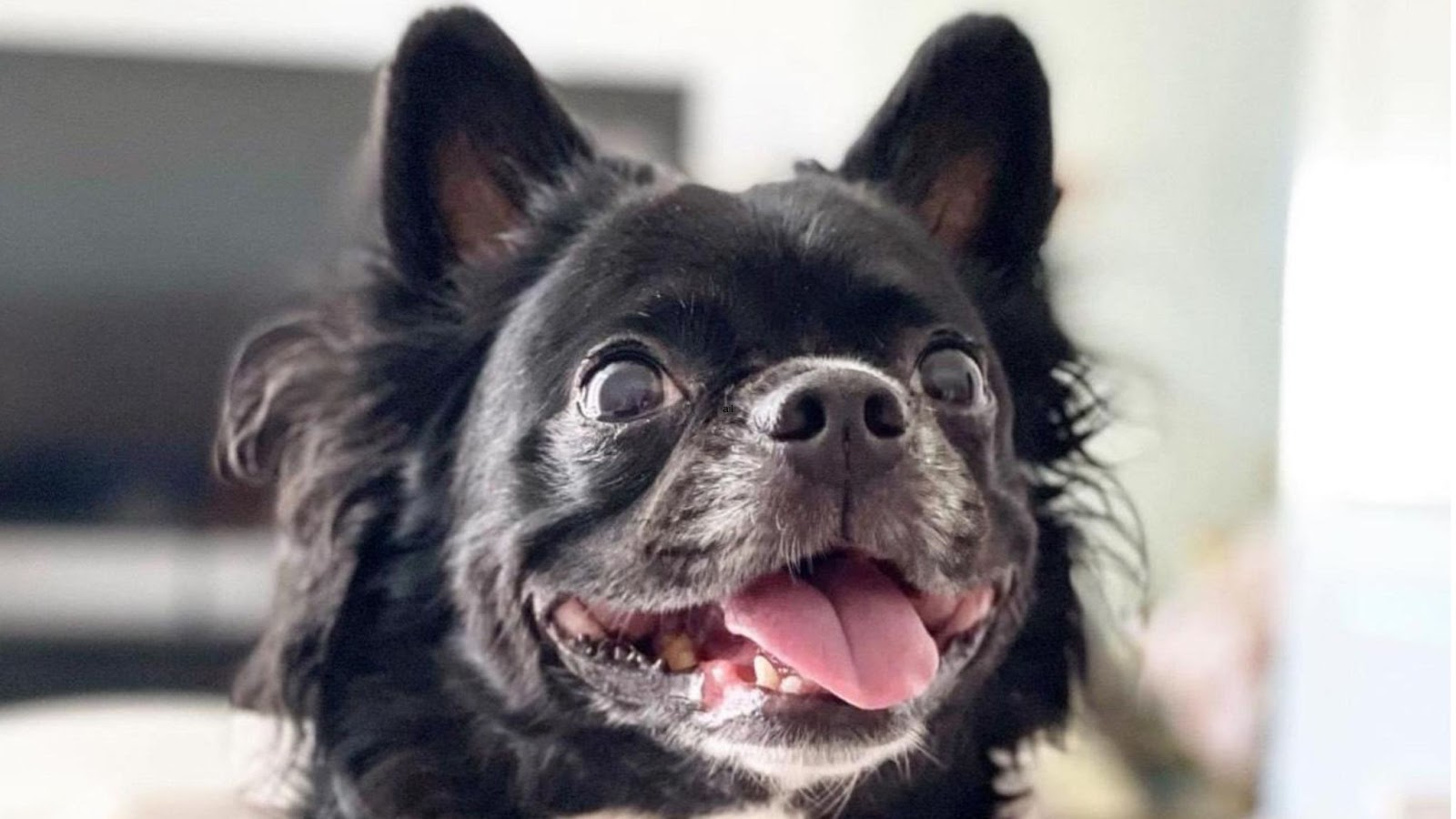When we think of Boston Terriers, the image that often comes to mind is of a sleek, tuxedo-patterned dog with short fur. However, the canine world is full of surprises, introducing us to rare gems like the fluffy Boston Terrier puppies.
One such unique case is Zapp, a purebred Boston Terrier with a long, fluffy coat that defies the typical breed standard. This extraordinary pup belongs to Jamie C., who has become an unexpected expert and the proud owner of this rare kind of Boston Terrier. Jamie’s journey with Zapp sheds light on the fascinating world of canine genetics and the boundless possibilities it holds. For more insights into Zapp’s life and his fluffy existence, follow him and Jamie on their Instagram accounts at @decaf_coffey and @doggy_devito.
Please note, true Fluffy Bostons are incredibly rare and a bit of a genetic surprise, so all images here are courtesy of Jamie C and subject to copyright.
So, Can You Get A Purebred Long-Haired Boston Terrier?
Yes, purebred long-haired Boston Terriers like Zapp do exist, but they are extremely rare. These fluffy Boston Terriers carry a unique set of genes that express a longer coat than the short-haired variety we’re accustomed to seeing. The existence of dogs like Zapp opens up a fascinating chapter in the understanding of canine genetics and breed standards.
Jamie’s Account of How She Got Zapp
Jamie’s adventure began with an ad in the paper for two Boston Terrier puppies that caught her eye with their adorable, fluffy appearances. Initially suspecting they might not be purebred due to their unusual long hair and the distinct lack of white markings typical of the breed, Jamie’s love for the puppies was instant and unconditional. Upon meeting them, she was introduced to their parents, who were both typical Boston Terriers, leaving everyone puzzled about the puppies’ fluffy coats.
Despite suspicions that perhaps a neighbor dog might have been the real father, Jamie’s connection with Zapp was immediate, leading her to bring him home. This decision marked the beginning of a journey filled with love, surprises, and the quest to understand Zapp’s unique genetics. After conducting two DNA tests, both results astonishingly confirmed Zapp as 100% Boston Terrier, showcasing the unpredictable nature of genetics and the special place Zapp holds as a rare long-haired variant of the breed.
Jamie’s account not only highlights the unpredictability of canine genetics but also the deep bond formed between her and Zapp, transcending the typical expectations of breed standards. Zapp’s story is a testament to the diversity within dog breeds and the extraordinary surprises they can bring into our lives.
Looking for proof that Purebred Fluffy Bostons exist? Well, just look at these DNA results:
DNA Test Number 1
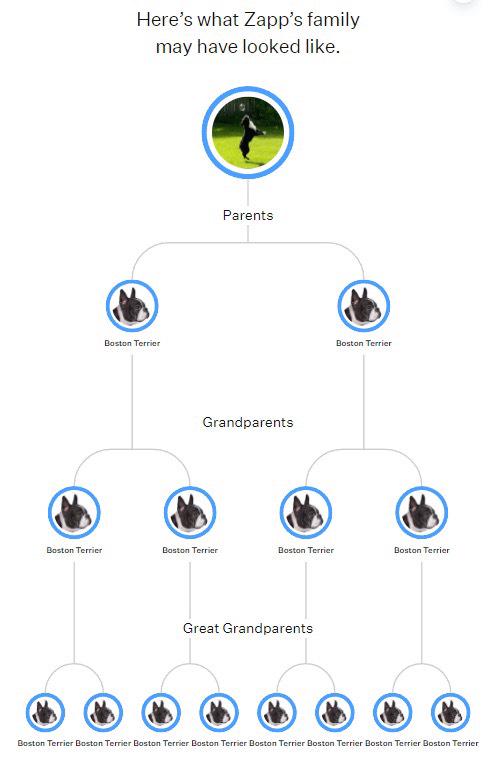
DNA Test Number 2 (From Embark–Courtesy of Jamie C.)
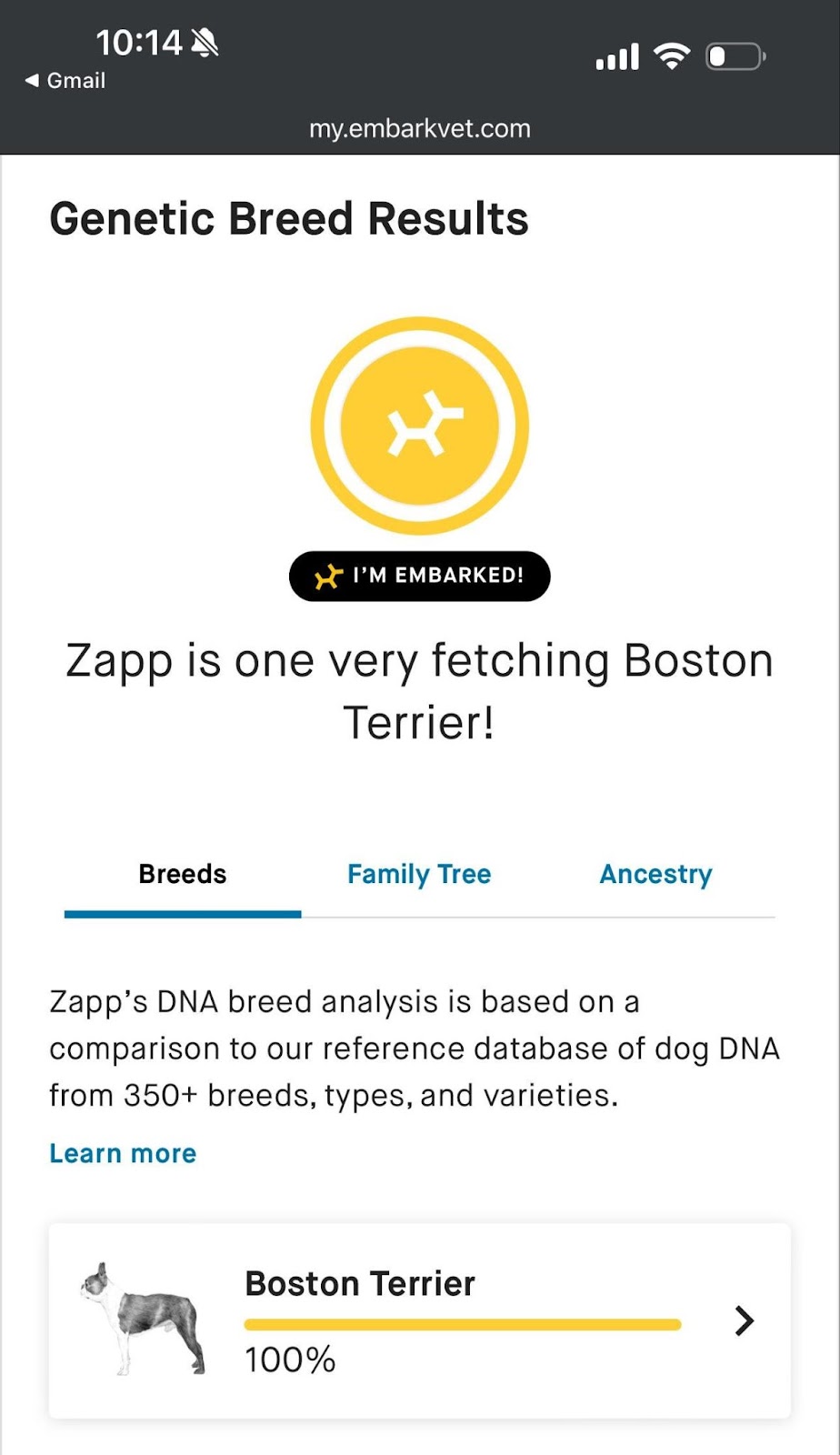
Breed History & Origins Of Long-Haired Boston Terriers
The Boston Terrier, a breed affectionately known as “The American Gentleman,” has a rich history dating back to the late 19th century in Boston, Massachusetts. Originating from a cross between English Bulldogs and now-extinct White English Terriers, Boston Terriers were initially bred for pit fighting. However, their friendly nature quickly made them a favorite as companion dogs, leading to their evolution into the breed we know today.
Ancestral Breeds: What Breeds Make a Long-Haired Boston Terrier?
While the classic Boston Terrier is known for its short, sleek coat, the occurrence of long-haired Boston Terriers like Zapp raises questions about their genetic lineage. Although traditionally not recognized within the breed’s standard, the long hair trait suggests a complex genetic background possibly influenced by other breeds or a mutation within the breed itself.
Similar to how other breeds such as the Long-Haired Dalmatian and the Long-Haired Corgi exhibit variations in coat length, it’s rare but still possible that Boston Terriers carry latent genetic potential for longer coats.
Historical Significance
The Boston Terrier’s development into a distinct breed was marked by their official recognition in the late 1800s. As one of the first breeds originated in the United States, Boston Terriers hold a special place in canine history. However, the emergence of long-haired individuals within the breed is a relatively recent and less documented phenomenon, adding a new chapter to their storied past.
The Breed Today
Today, Boston Terriers are celebrated for their friendly disposition, compact size, and distinctive tuxedo-like markings. While the majority of Boston Terriers possess the breed’s hallmark short coat, the rare appearance of long-haired specimens like Zapp showcases the genetic diversity that exists within the breed.
Kennel Club Recognition
Currently, kennel clubs, including the American Kennel Club (AKC), recognize the Boston Terrier with specific breed standards that do not include long-haired varieties. As such, long-haired Boston Terriers are not eligible for breed-standard competitions. However, this does not mean that there is anything wrong with a bit of uniqueness and diversity in the breed.
Remember, the best Boston Terrier in the world is your Boston Terrier. And since there are no health issues related to a bit of fluff, we at Boston Terrier Hub, love these fluffy pups just as much all Bostons!
The Genetics of Hair Coats in Boston Terriers
It’s widely accepted that Boston Terriers have the S/S locus for short hair, theoretically precluding the possibility of producing long-haired offspring. Prospective owners seeking a fluffy Boston Terrier should approach with caution, as these puppies are likely crossbred. Yet, the realm of genetics often reveals surprises.
Similar to the long-haired variety of Dalmatians, Boston Terriers may also exhibit unexpected traits. A study published in the journal Animal Genetics explains that hair length in dogs is primarily controlled by a few genes, with the FGF5 gene playing a crucial role in determining hair length across various breeds. This research underscores the complexity of canine genetics and suggests that, while rare, the occurrence of long-haired Boston Terriers like Zapp is within the realm of genetic possibility.
So, although it’s extremely rare, it’s not impossible to get a Boston Terrier with a longer coat.
By understanding the genetic underpinnings and acknowledging the breed’s history, we gain a greater appreciation for the diversity within the Boston Terrier breed and the canine world at large. The existence of long-haired Boston Terriers serves as a reminder of nature’s capacity for variation and the joy of embracing the unique traits that make each dog special.
Physical Characteristics of Boston Terriers
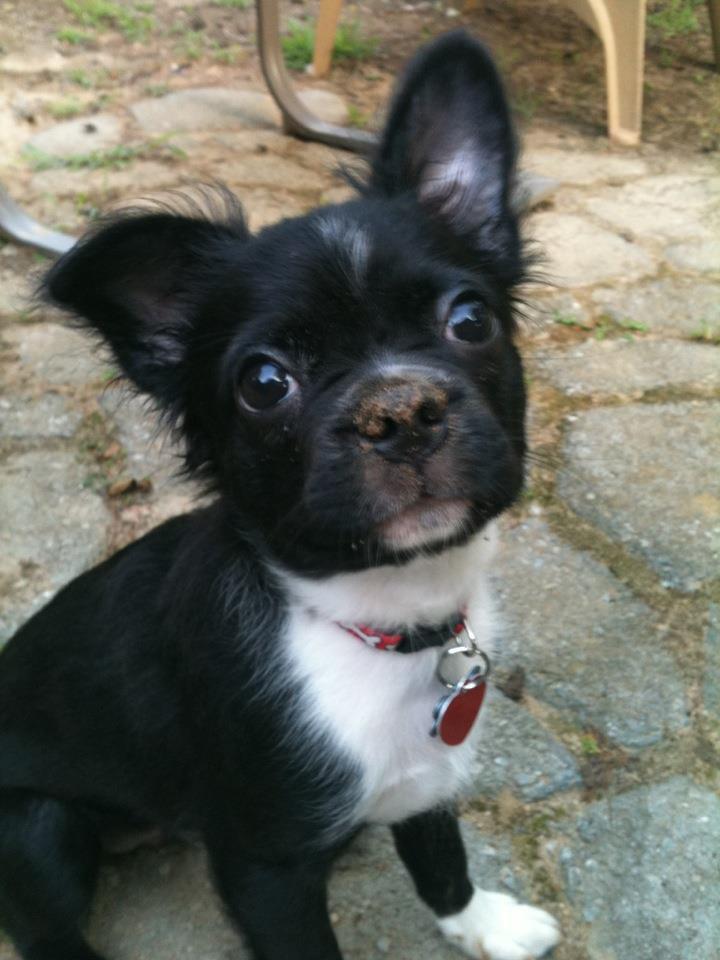
Boston Terriers, renowned for their compact size and charming personalities, display a variety of physical traits that make them stand out among dog breeds. Here, we’ll delve into the specifics of their physical characteristics, focusing on both the traditional aspects and the unique features seen in rare long-haired specimens like Zapp.
Size And Build
Boston Terriers typically stand about 15 to 17 inches tall at the shoulder. Their stature is well-proportioned, contributing to their distinctive, square appearance.
The body length of a Boston Terrier, from the tip of the nose to the tip of the tail, generally mirrors their height, giving them a balanced and sturdy look.
These dogs are classified into three weight categories: under 15 pounds, 15 to 20 pounds, and 20 to 25 pounds. This range allows for variation in size while maintaining the breed’s characteristic compactness.
Appearance
Boston Terriers are known for their tuxedo-like markings, which contribute to their nickname, “The American Gentleman.” They have short tails, a broad chest, and a square head with a short snout. Their ears are small and erect, adding to their alert and friendly expression. The nose is typically black and prominently set on their flat face.
Coat And Colors
The traditional Boston Terrier sports a short, smooth coat that lies flat against the body in the breed standard. However, long-haired Boston Terriers like Zapp feature a rare coat variation that is longer and fluffier, though still soft to the touch.
The breed standard recognizes three color patterns: brindle with white, black with white, and seal (a black color with a red undertone in sunlight) with white. Long-haired variants can display these colors as well, though their unique coat texture may highlight the patterns differently.
Boston Terriers are moderate shedders, with the amount of shedding varying from one dog to another. Long-haired Boston Terriers may require more frequent grooming to manage shedding and keep their coat in good condition.
While no dog breed is completely hypoallergenic, Boston Terriers, with their short coats, are often considered to be lower on the scale of allergy triggers. The long-haired variety, due to their unusual coat type, may not fit this generalization as closely and could require special consideration for individuals with allergies.
Temperament and Personality
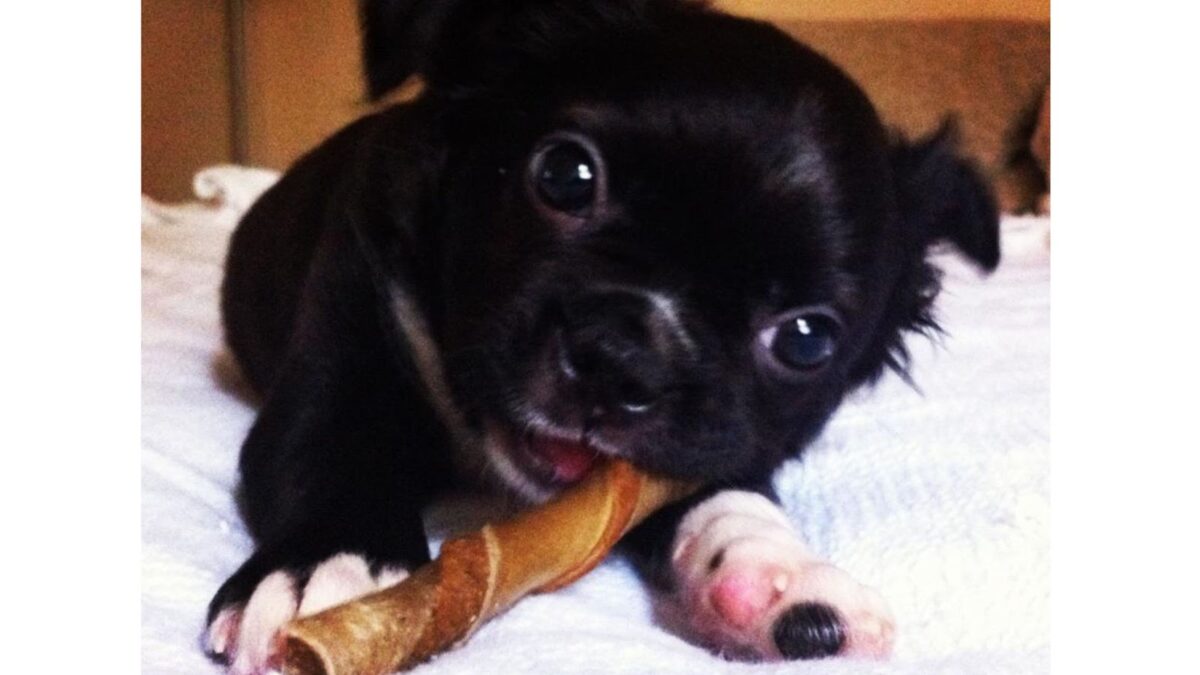
Boston Terriers are celebrated for their affable nature and strong, friendly personalities, making them excellent companions for a wide range of families and living situations. This section explores their temperament and personality, with insights into how these traits manifest in unique cases like Zapp.
General Disposition
Boston Terriers are known for their lively, affectionate demeanor. They possess a balanced character, being neither too aggressive nor too shy. Their eagerness to please and innate intelligence make them both delightful companions and responsive to training. As Jamie C., Zapp’s owner, shares, “He [Zapp] honestly acts so much like a Boston it’s ridiculous. He has all the friendly, energetic demeanor of a Boston. He thinks he’s a person and prefers the company of people to dogs.”
Interaction with Children and Other Pets
With their gentle disposition, Boston Terriers typically get along well with children, showing patience and playfulness in equal measure. They also tend to do well with other pets, especially when socialized from a young age. Zapp’s story is a testament to this breed’s adaptable and sociable nature, thriving in a home environment filled with love and interaction.
Common Behavioral Traits
Boston Terriers are curious, intelligent dogs that love to be involved in family activities. They can be quite expressive, using a range of sounds and body language to communicate with their owners. Their adaptability makes them suitable for both active families and more laid-back individuals, as they’re just as happy going for a walk as they are cuddling on the couch. However, like all dogs, they benefit from consistent, positive reinforcement training to curb any stubborn streaks.
Jamie’s experience with Zapp highlights the quintessential Boston Terrier personality: “He’s very very smart and was super easy to train because he doesn’t like disappointing people.” This direct quote from Jamie underscores the breed’s eagerness to please and their quick learning ability, traits that endear them to their human families.
Health and Lifespan
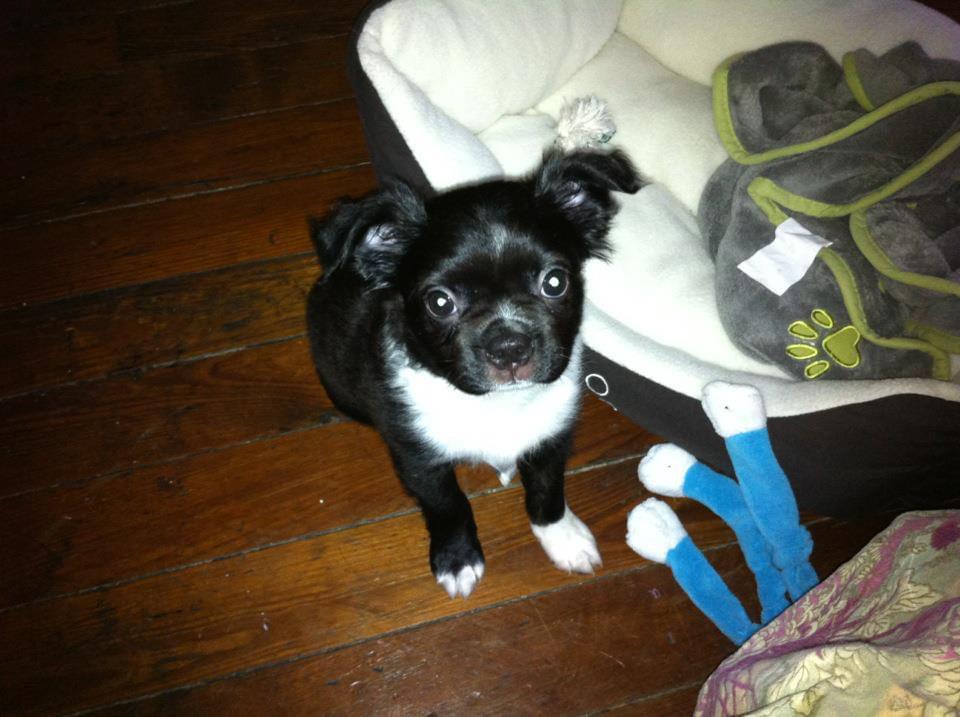
Boston Terriers are generally known for their robust health, but like all breeds, they have certain predispositions to specific health issues. This section delves into their health, lifespan, and ways to ensure these charming longer hair varieties of Boston Terrier dogs lead a happy, healthy life, drawing on insights from Zapp’s owner, Jamie Coffee.
Average Lifespan
The average lifespan of a Boston Terrier ranges from 11 to 13 years. With proper care, regular veterinary check-ups, and a healthy lifestyle, some Boston Terriers can live even longer. Jamie mentions, “He’s [Zapp] almost 12 now so we let him mostly be a wild man,” highlighting Zapp’s good health and vitality in his senior years.
Common Health Issues
Boston Terriers may face several breed-specific health issues, such as respiratory problems due to their brachycephalic (flat-faced) nature, eye issues including cataracts, and patellar luxation. Moreover, due to their compact build, they can be prone to obesity if not given a proper diet and adequate exercise.
Jamie addresses a specific concern with Zapp, noting, “He also has IVDD (Intervertebral Disc Disease) in his neck so we are a lot more careful about play.” She also mentions he is prone to tummy issues. This highlights the importance of being aware of potential genetic health issues and taking proactive measures to manage them.
For more information on Boston Terrier health issues, see the linked article.
Preventative Care Tips
To ensure the well-being of a longer haired Boston Terrier, regular veterinary check-ups are crucial for early detection and management of breed-specific health conditions, like deafness. A balanced diet and regular exercise can help prevent obesity, a common problem in the breed.
Additionally, paying attention to dental health, keeping up with vaccinations and parasite prevention, and monitoring for signs of respiratory distress are all important aspects of caring for a Boston Terrier.
In summary, while purebred Long hair Boston Terriers like Zapp may face certain breed-specific health challenges, with attentive care, regular veterinary support, and a healthy lifestyle, they can lead full, vibrant lives. Jamie Coffee’s experiences with Zapp offer a real-world perspective on the joys and responsibilities of caring for these unique and lovable dogs, underscoring the importance of proactive health management and the deep bond between pets and their owners.
Exercise and Housing Needs
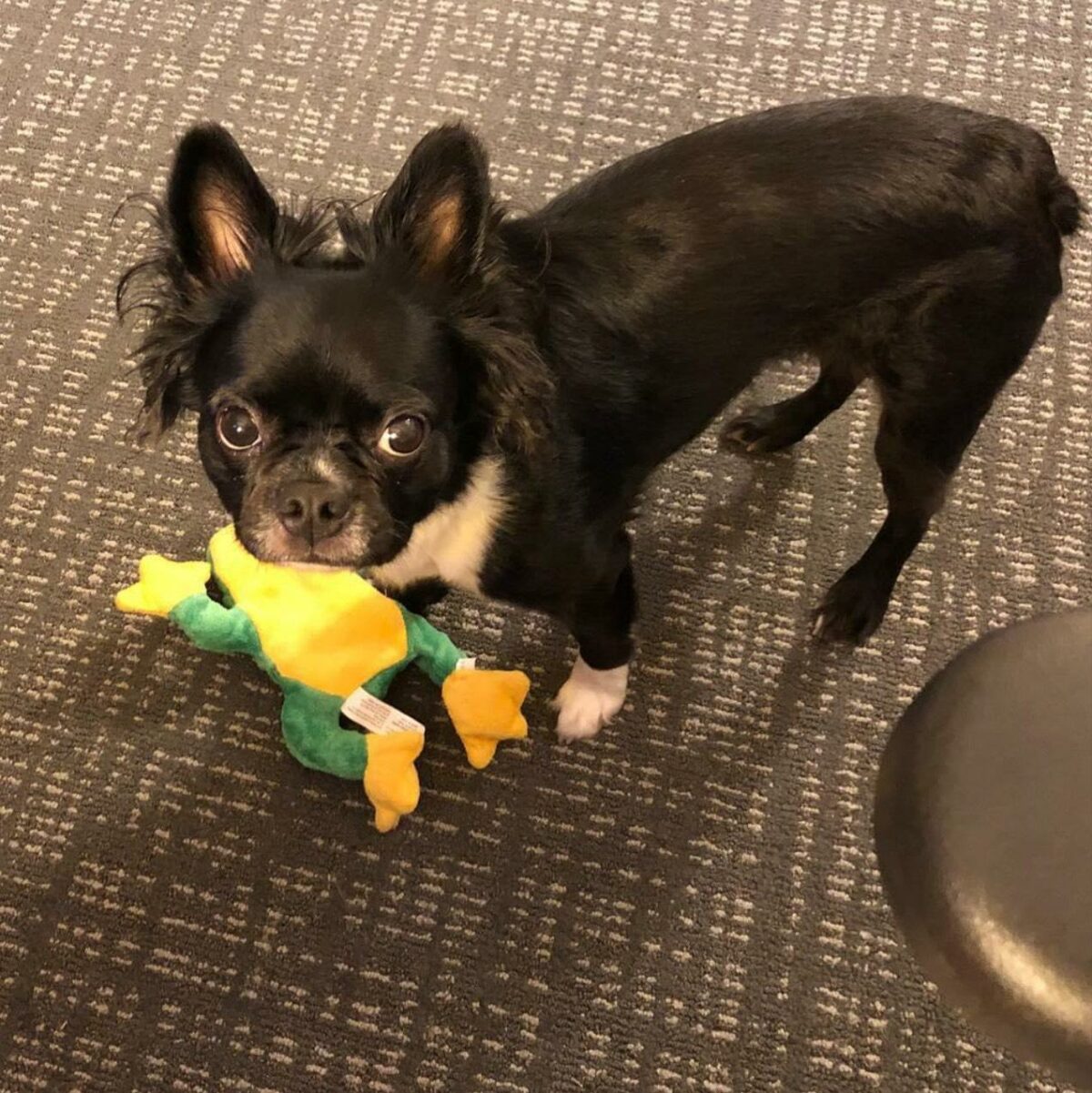
Boston Terriers, with their adaptable and friendly nature, have specific exercise and housing requirements that ensure they lead balanced, healthy lives. Let’s explore how to best accommodate these needs, incorporating insights from Zapp’s owner, Jamie Coffee.
Daily Exercise Requirements
Despite their small size, Boston Terriers are energetic and require regular exercise to maintain their health and happiness. “We do walk him a mile a day and he plays many rounds of fetch,” Jamie shares about Zapp, emphasizing the importance of daily physical activity. A combination of walks, playtime, and mental stimulation through interactive games can keep a Boston Terrier physically fit and mentally sharp.
Space Requirements
Boston Terriers are well-suited to a variety of living situations, from apartments to larger homes with yards. Their compact size means they don’t require vast amounts of space, but they do appreciate having room to play and explore. As Jamie mentions, Zapp was quite active, especially in spacious environments like Manhattan, indicating that while they adapt well to smaller spaces, they thrive when given room to roam.
Suitable Living Conditions
The breed’s adaptable nature makes them excellent companions for both active individuals and those with a more sedentary lifestyle. However, because of their brachycephalic (short-nosed) facial structure, they should live in environments where they can stay cool and well-ventilated, especially during hot weather. Comfortable indoor spaces where they can relax and stay close to their family are ideal for Boston Terriers.
Training and Socialization
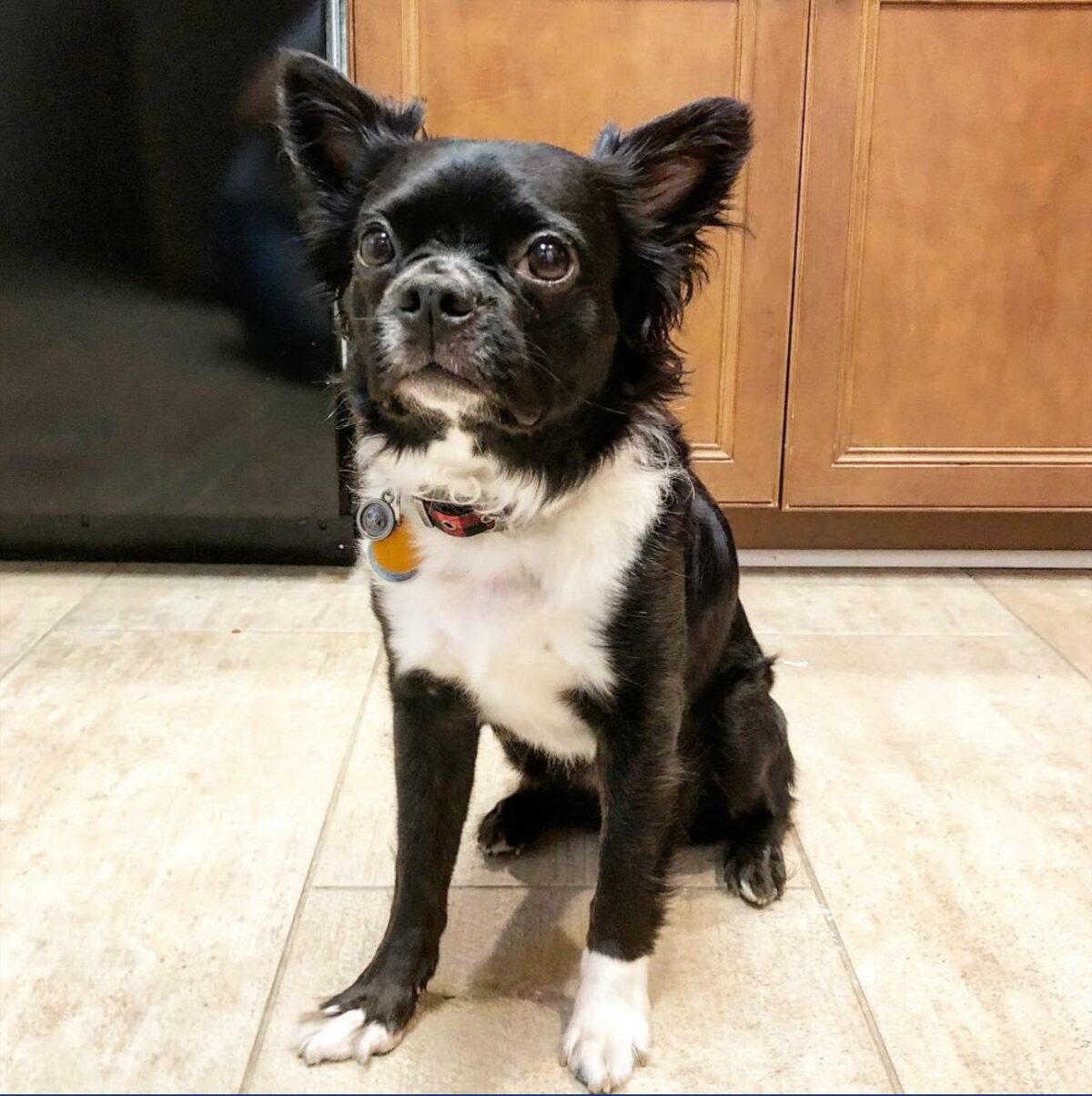
Training and socialization are crucial for ensuring that Boston Terriers grow into well-mannered, sociable pets. Let’s delve into what makes training these intelligent dogs a rewarding experience.
Trainability
Boston Terriers are known for their intelligence and eagerness to please, which makes them highly trainable. “He’s very very smart and was super easy to train because he doesn’t like disappointing people,” says Jamie about Zapp, highlighting the breed’s responsive nature to positive reinforcement and their desire to make their owners happy.
Socialization Needs
Early socialization is key for Fluffy Boston Terriers to develop into well-adjusted adults. Exposing them to a variety of people, environments, and other animals can help prevent shyness or aggression. Zapp, having been an emotional support dog, demonstrates the breed’s capability for interaction and comfort in diverse settings, underscoring the importance of social experiences.
Behavioral Training Tips
Consistency and positivity are the cornerstones of training Long-haired Boston Terriers. Using rewards and praise to reinforce good behavior rather than punishment for missteps encourages them to learn and engage. Training sessions should be short, fun, and varied to keep their attention. Given their sociable nature, Boston Terriers like Zapp respond well to affection and acknowledgement, making training a bonding experience for both dog and owner.
Diet and Nutrition
Proper diet and nutrition are fundamental for keeping long haired Boston Terriers healthy and happy throughout their lives. These aspects are particularly important considering the breed’s propensity for obesity and sensitivity to certain foods.
Dietary Needs
Boston Terriers require a balanced diet rich in high-quality proteins, fats, carbohydrates, vitamins, and minerals. Their food should be appropriate for their age, size, and activity level. “He’s [been] a picky eater his whole life, and we just found a food that he enjoys within the last year,” Jamie explains about Zapp, highlighting the importance of finding a diet that not only meets nutritional needs but also suits the dog’s preferences.
Feeding Schedule
Consistent feeding schedules help manage digestion and weight. Adult Boston Terriers typically thrive on two meals per day. Puppies may require more frequent feedings, up to four times a day, to support their rapid growth and development.
Special Dietary Considerations
Given their sensitivity to certain foods and propensity for gas, it’s important to choose a diet that minimizes these issues. Foods that are easily digestible and low in fillers can help reduce gastrointestinal discomfort, a common concern for the breed. “Following other Bostons… I’ve gotten really exposed to their behaviors and sensitive tummy and gas issues,” says Jamie, which many Boston Terrier owners can likely relate to.
Grooming Needs
Grooming is an essential aspect of caring for a Boston Terrier, even more so for those with a unique coat like Zapp’s.
Grooming Frequency
Short-haired Boston Terriers require minimal grooming, including regular baths, nail trims, and ear cleaning. However, long-haired varieties like Zapp need more frequent grooming to prevent matting and keep their coat in good condition. “We bathe him once a month… and used to take the clippers to his chest, stomach, and hind legs,” shares Jamie, indicating a more involved grooming routine.
Grooming Tools
Essential grooming tools for Boston Terriers include a high-quality dog shampoo, a bristle brush for short-haired varieties, and a pin brush or detangling comb for long-haired dogs. Nail clippers and ear cleaning solutions are also important for overall grooming.
Grooming Tips
Regular brushing helps distribute natural oils throughout the coat, keeping it healthy and shiny. For long-haired Boston Terriers, gentle detangling of the fur can prevent mats and keep the coat looking its best. Starting grooming routines early in life can help your Boston Terrier become comfortable with the process.
Cost of Ownership for a Long-Haired Boston Terrier
Owning a Long-Haired Boston Terrier, or any variation of this affectionate breed such as a Fluffy Boston, involves several financial commitments. From the initial purchase to ongoing care, here’s a breakdown of the estimated costs involved in owning one of these unique companions.
Initial Cost (Long Haired Boston Terrier Puppy Price)
The purchase price for a Boston Terrier puppy can range widely, generally falling between $600 to $1,200 for standard coat varieties from reputable breeders. However, for rare long-haired or fluffy Boston Terrier puppies, the price can be higher due to their uncommon appearance, potentially reaching up to $2,000 or more, depending on the breeder and the specific characteristics of the puppy.
Ongoing Costs
- Food: High-quality dog food is essential for maintaining the health of a Long-Haired Boston Terrier. Owners can expect to spend approximately $20 to $60 per month on dog food, depending on the brand and the dog’s size.
- Grooming: Fluffy Bostons require more frequent grooming than their short-haired counterparts. Professional grooming sessions, which may include bathing, hair trimming, and nail clipping, can cost around $40 to $60 per visit. Owners might need grooming services every 2 to 3 months, adding up to around $160 to $240 annually, not including at-home grooming supplies.
- Veterinary Care: Routine veterinary care, including vaccinations, annual check-ups, and parasite prevention, is crucial. These costs can average $200 to $300 per year. However, potential health issues specific to the breed, such as respiratory or orthopedic problems, could lead to additional expenses. Setting aside an emergency fund or investing in pet insurance, which can range from $200 to $600 annually, is advisable for unexpected medical costs.
- Miscellaneous: Other expenses, such as toys, beds, leashes, and collars, can add approximately $50 to $100 annually. Training classes, if opted for, can also add to the cost, potentially ranging from $50 to $200 for basic obedience courses.
In total, the first year of owning a Long-Haired Boston Terrier can cost between $1,000 to $3,000, considering all initial and ongoing expenses. Subsequent years may range from $500 to $2,000 annually, depending on health care costs, grooming needs, and lifestyle choices.
These estimates aim to provide prospective Long-Haired Boston Terrier owners with a comprehensive view of the financial commitment required. Embracing a Fluffy Boston into your life brings immense joy and companionship, balanced by the responsibility of ensuring their well-being through proper care and investment.
Cost of Ownership for a Long-Haired Boston Terrier
Owning a Long-Haired Boston Terrier, or any variation of this affectionate breed such as a Fluffy Boston, involves several financial commitments. From the initial purchase to ongoing care, here’s a breakdown of the estimated costs involved in owning one of these unique companions.
Initial Cost (Puppy Price)
The purchase price for a Boston Terrier puppy can range widely, generally falling between $600 to $1,200 for standard coat varieties from reputable breeders. However, for rare long-haired or fluffy Boston Terrier puppies, the price can be higher due to their uncommon appearance, potentially reaching up to $2,000 or more, depending on the breeder and the specific characteristics of the puppy.
Ongoing Costs
- Food: High-quality dog food is essential for maintaining the health of a Long-Haired Boston Terrier. Owners can expect to spend approximately $20 to $60 per month on dog food, depending on the brand and the dog’s size.
- Grooming: Fluffy Bostons require more frequent grooming than their short-haired counterparts. Professional grooming sessions, which may include bathing, hair trimming, and nail clipping, can cost around $40 to $60 per visit. Owners might need grooming services every 2 to 3 months, adding up to around $160 to $240 annually, not including at-home grooming supplies.
- Veterinary Care: Routine veterinary care, including vaccinations, annual check-ups, and parasite prevention, is crucial. These costs can average $200 to $300 per year. However, potential health issues specific to the breed, such as respiratory or orthopedic problems, could lead to additional expenses. Setting aside an emergency fund or investing in pet insurance, which can range from $200 to $600 annually, is advisable for unexpected medical costs.
- Miscellaneous: Other expenses, such as toys, beds, leashes, and collars, can add approximately $50 to $100 annually. Training classes, if opted for, can also add to the cost, potentially ranging from $50 to $200 for basic obedience courses.
In total, the first year of owning a Long-Haired Boston Terrier can cost between $1,000 to $3,000, considering all initial and ongoing expenses. Subsequent years may range from $500 to $2,000 annually, depending on health care costs, grooming needs, and lifestyle choices.
Adoption and Buying Tips for Long-Haired Boston Terriers
Finding a Long-Haired Boston Terrier, whether through adoption or purchase, requires careful consideration to ensure you bring home a healthy, happy puppy that fits well with your lifestyle. Here are some tips for prospective owners looking to welcome a Fluffy Boston into their lives.
Where to Adopt/Buy
- Adoption: Check local shelters and Boston Terrier rescue organizations first. While finding a long-haired variety through adoption might be rare, it’s not impossible. Adoption fees typically range from $50 to $300.
- Reputable Breeders: If you’re looking to buy, especially for a rare Long-Haired Boston Terrier, it’s crucial to find a reputable breeder who specializes in the breed. Prices can vary widely based on the puppy’s lineage and the rarity of the long coat trait.
What to Look for in a Breeder
- Health Clearances: A reputable breeder should provide health clearances for the puppy’s parents, proving they’ve been tested for common genetic diseases.
- Transparency: Good breeders will welcome questions about their breeding practices and be willing to show you where the puppies are raised.
- Breed Knowledge: Breeders should be knowledgeable about Boston Terriers, including specific considerations for long-haired varieties.
- After-Sale Support: Look for a breeder who offers support after you take your puppy home, such as advice on care and feeding.
Choosing the Right Puppy/Dog
- Temperament: Spend time with the puppy to assess its temperament. Look for a puppy that is friendly, curious, and not overly shy or aggressive.
- Physical Health: Check for signs of good health, such as clear eyes, clean ears, and a healthy coat. Ask about vaccinations and deworming.
- Socialization: Puppies that have been well-socialized from a young age are generally more adaptable and confident.
Breed-Specific Considerations
- Climate Suitability: Boston Terriers, especially those with long hair, can be sensitive to extreme heat due to their brachycephalic nature. Consider your local climate and whether it’s suitable for the breed.
- Compatibility with Lifestyle: Ensure your lifestyle can accommodate the exercise, grooming, and companionship needs of a Boston Terrier. They are social animals that thrive on human interaction.
- Special Needs: Be prepared for potential breed-specific health issues, including respiratory and skin conditions. Long-haired varieties may require additional grooming care to keep their coat in good condition.
Ethical Breeding Practices
When considering a breeder, ethical practices are paramount. Ethical breeders prioritize the health, well-being, and genetic diversity of their dogs. They should be focused on improving the breed rather than just selling puppies. Be wary of breeders who seem to prioritize the coat length or color over the health and temperament of their dogs.
By following these tips and considerations, prospective Long-Haired Boston Terrier owners can make informed decisions, ensuring they find a healthy, well-socialized puppy that will become a cherished member of their family. Whether through adoption or purchase, the addition of a Fluffy Boston to your home promises to bring joy, companionship, and a little extra fluff into your life.
Conclusion
In conclusion, welcoming a Long-Haired Boston Terrier into your life is a unique and rewarding experience that brings with it a special set of considerations and joys. From understanding their distinct dietary needs and grooming requirements to ensuring their health, exercise, and socialization needs are met, owning a Fluffy Boston is a commitment to providing a loving and supportive environment for these rare and affectionate companions.
Prospective owners should approach the adoption or purchase process with care, prioritizing ethical breeding practices and choosing a puppy or dog that fits well with their lifestyle and environment. It’s essential to remember that, despite the rarity of their long coats, these dogs share the same endearing qualities and potential health considerations as their short-haired counterparts.

